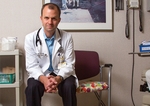profession

A YMCA program provides the kind of “ongoing support and education and encouragement” that patients need to achieve healthier lifestyles, says Mona Roach, MD, a family physician in Hastings, Minn. As part of a separate effort, a community garden next to her clinic is used by the hospital and nursing home cafeteria to help promote healthy eating. “It's rewarding to know that we can prevent diabetes.” Photo by Craig Lassig / AP Images for American Medical News
Diabetes prevention: Set on a course for lifestyle change
■ The YMCA's evidence-based program is helping prediabetic patients eat right, get active and lose weight.
» View slide show: Peer support helps prevent diabetes
- WITH THIS STORY:
- » Who is a candidate for diabetes prevention?
- » The YMCA's effort by the numbers
- » External links
- » Related content
Mona Roach, MD, is committed to preventive medicine. The Hastings, Minn., family physician takes special note when her patients meet the criteria that put them at risk for type 2 diabetes. But it has been difficult to help these patients avoid or delay the onset of this costly and potentially crippling chronic condition.
“I'd say to patients, 'Right now, you're on the road to diabetes, and if you want to get off that road we need to do some things. And the biggest thing to do to get you off that road is to figure out how to lose weight,' ” Dr. Roach says.
“You try to give as much encouragement as you can, but ultimately it's up to the person,” she says. “I could talk to somebody once in the office about it, but then they leave and do what they want.”
Dr. Roach's options for where to send these prediabetic patients were limited — perhaps a referral to a dietitian or a suggestion to check out Weight Watchers. Now that's changed.
In 2013, two of her patients and four others treated at the Allina Medical Clinic where she works have taken advantage of an intensive, yearlong YMCA group class aimed at preventing diabetes. One of Dr. Roach's patients lost 25 pounds through the lifestyle-modification program and has seen her blood sugar drop by nine points. On average, the clinic's patients lost 5.2% of their body weight — the kind of modest reduction that has been shown to be effective in staving off diabetes.
“The YMCA program really combines the diet and exercise and education elements,” Dr. Roach says. “It's definitely the best tool we have to treat prediabetes.”
Only the beginning
This comprehensive, community-oriented approach to preventive medicine soon will grow more widespread. The Hastings YMCA, where these patients have gone for weekly, evidence-based instruction from a lifestyle coach in meetings with other prediabetics, is one of nearly 90 metro areas in 35 states where the diabetes-prevention program is offered. That will grow to more than 300 YMCAs by the end of 2017, including 119 in the nation's largest metropolitan areas.
In April, the American Medical Association announced a multiyear, multimillion-dollar initiative aimed at improving blood pressure control and preventing diabetes. The AMA is partnering with the YMCA to increase physician referrals to its diabetes-prevention classes and establish a way for doctors' offices and local YMCAs to better share information about patient progress.
“We have to figure out ways to get into communities and get patients engaged in this,” then-AMA President Jeremy A. Lazarus, MD, said this spring. “It's not just about giving pills to people, but to help them lead healthier lifestyles.”
The national YMCA of the USA was awarded a three-year, $12 million grant from the federal Center for Medicare and Medicaid Innovation to make its diabetes-prevention program available to about 10,000 Medicare patients in 17 communities. Medicare fee-for-service patients pay no additional out-of-pocket cost for the YMCA class and 27 private health plans cover it. For other patients, the fee is charged on an income-based sliding scale that varies by facility and can reach $400, says Matt Longjohn, MD, MPH, the national health officer at YMCA of the USA.
Dr. Longjohn notes that 80% of U.S. households live within five miles of a YMCA, so most Americans will find it just as easy to access diabetes-prevention classes as to see the latest popcorn flick at the multiplex.
DID YOU KNOW:
Prediabetics are up to 5 times likelier than patients with normal blood glucose levels to develop type 2 diabetes.
This prevention effort will not come a moment too soon, say physicians and other experts.
Already, 26 million Americans have diabetes, more than 8% of the U.S. population. Researchers estimate that one in three U.S. patients — about 80 million — can be classified as prediabetic either because of their scores on diagnostic blood tests or a combination of age, family history of diabetes and other factors. Patients with prediabetes are two to five times likelier than patients with normal blood glucose to develop type 2 diabetes. Ten percent of prediabetics will become diabetics within seven years, says Ronald T. Ackermann, MD, MPH, associate professor of medicine at Northwestern University Feinberg School of Medicine in Chicago.
If current trends continue, the Centers for Disease Control and Prevention estimates that as many as a third of U.S. adults will be diabetic by 2050. Diabetes not only lowers the quality of life for patients — endangering limbs, eyesight and kidneys — but also contributes to more than 230,000 U.S. deaths annually. The condition accounts for nearly $250 billion in direct medical expenses and lost productivity, according to the American Diabetes Assn.
Keeping pace with the problem means forging tighter links among primary care physicians, hospitals and community-based programs like the YMCA's, says Ann Albright, PhD, director of the CDC Division of Diabetes Translation.
“With diabetes, the gains we've been making in reducing complications … are being undermined, because we have so many new cases of diabetes,” she says. “This is a huge problem. It's all hands on deck.”
Program borne out of evidence
The YMCA's lifestyle-modification program has been recognized with six other organizations for adhering to diabetes-prevention program standards established by the CDC National Diabetes Prevention Program. Those protocols — such as what topics are covered in weekly meetings and how lifestyle coaches are trained — are drawn from evidence established more than a decade ago showing that even modest changes have a big impact.
A randomized controlled trial of more than 3,000 patients with prediabetes found that patients exposed to an intensive lifestyle-modification program that aimed for 7% weight loss and 150 minutes in weekly physical activity were 58% less likely to develop diabetes than those who received standard lifestyle recommendations and took a placebo pill. During the study's three-year period, the patients who got the comprehensive lifestyle support in the form of 16 lessons covering diet, exercise and behavior modification avoided diabetes at a rate nearly double that of patients who got the standard advice and took the diabetes drug metformin.
For every seven prediabetics who participated in the lifestyle-modification program, one case of diabetes was avoided, said the study in the Feb. 7, 2002 issue of The New England Journal of Medicine.
The challenge has been to take those lessons and spread them across the U.S. About 1,300 lifestyle coaches have been trained by the YMCA, helping patients in nearly 600 locations, and program participants have averaged 4.9% weight loss since 2003.
But where the NEJM intervention was one-on-one counseling, the Y's one-hour sessions are group-based. That helps lower costs, expand the program's reach and draw on the power of social ties to spur participants on. Groups meet once weekly for 16 weeks to cover specific curriculum topics, then once monthly for 36 weeks. Individuals can keep attending sessions after that, and some keep in touch with friends from class.
Simple and social is a winning recipe
Two factors help the Y's diabetes-prevention approach succeed, says Gail Wright, a lifestyle coach at the YMCA of Greater Indianapolis. She also is a certified personal trainer and works full time in communications for the Indiana State Dept. of Health.
“One reason is simplicity,” she says. Instead of complicated point-counting or avoiding whole food groups, patients are taught to look for fat grams and calorie counts and to redo favorite recipes to slim down.
“I have had people who have a hard time believing me when I say that all we want you to do is count your fat grams. … I say, 'If you need something more complicated, your doctor will tell you.' Let's do the simplest method first,” Wright says.
“The other part is the camaraderie,” she adds. “You meet for 16 weeks, and there's a bonding that occurs within each of these groups. I always tell them that what they come up with are some of the best ideas I've ever heard, because I'm not doing the program — they are. … We're just giving them the opportunity to find what works. I think that class encouragement keeps them coming back.”
The patients support one another, sharing successes and challenges, helping each other find nutritional information for restaurant menus and swapping recipes for gazpacho.
One participant in Wright's current class is Lori Harris, who works for an electronics manufacturer. A letter from her physician told her that her hemoglobin A1c level was in the prediabetic range and informed her of the YMCA class.
Harris is 44. Her mother, father, five sisters and brother all developed diabetes in their 40s. She considered it “inevitable” that she, too, would become a diabetic. But she wanted to try the class, despite previous failures to lose weight. Harris found the program's approach sensible, even though she describes herself as a “very picky eater.”
“You can still focus on what you want to eat,” she says. “You just make smarter choices about what to eat.”
Harris also makes time to work out at the Y three times a week and takes simple opportunities to be more active, like walking up and down her driveway for 10 minutes. Since starting the class in April, she has lost 21 pounds — a 9% drop in body weight.
“I'm noticing the difference,” she says. “I was having trouble going down the stairs with my knee. I thought I was just getting older. Now I'm feeling it's a lot easier just walking downstairs.”
Wise use of evidence-based programs such as the YMCA's could make physicians' role in diabetes prevention more like their role in lung cancer prevention through tobacco cessation, experts say: Identify patients at risk; inform them of the risks; and counsel, cajole and encourage them to take advantage of the available options to take control of their health.
That is the path at Christiana Care Health System in Wilmington, Del. About 30 patients have been referred by Christiana physicians to the local Y's diabetes-prevention program in the past six months, says Michael Rosenthal, MD, chair of the system's Dept. of Family and Community Medicine. He says programs like the YMCA's can greatly assist time-squeezed doctors to deliver preventive medicine.
“In primary care, you've got an awful lot of things to take care of,” Dr. Rosenthal says. “Even if I spent 15 minutes on this prediabetes focus with a patient every three or six months, that might seem like a lot of time, but it's only an hour in the whole year. It would be a great help to a lot of doctors if the patient can work with someone over four months in classes. Then you can follow up to see how they've done in the class. The patients are going to get a lot more education over a four-month period of time than I could ever do in the office.”












